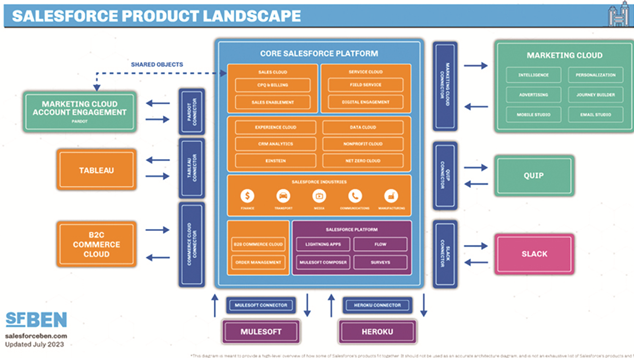Now that you have understood the CRM applications and also why Salesforce is very popular among CRM applications, it is time to dig deeper into the Salesforce ecosystem. As we have pointed out earlier, Salesforce is not just one application but an ecosystem of applications, either built by Salesforce themselves or by Salesforce partners. Together, they make the Salesforce platform very powerful and capable of handling unique business processes.
Let’s take a look at the following diagram:

Figure 1.5: Salesforce ecosystem of applications. Source: https://www.salesforceben.com/salesforce-products/
Even for those who have experience working on the Salesforce platform, it is difficult to wrap their heads around all the different Salesforce products. One of the reasons for the confusion is due to the ever-changing names of the products. By the time you get habituated to the name of a product, Salesforce will decide to change the name or package the same product differently. The name changes because of changing industry needs. So, it just might be the case that when you are reading the book, the names are already changed. In any case, whatever the future name, the functionalities of the core product remain the same sans some upgrades.
Back to the Salesforce products. In the middle, there is the core Salesforce platform. This forms the base of the Salesforce products. It has the following applications:
- Sales Cloud: For managing Sales processes
- Add-ons- CPQ and Billing, High-velocity sales, Lightning Dialer, and so on
- Service Cloud: For managing service processes and customer support teams
- Add-ons- Field service, digital engagement, service cloud voice, and so on
- Salesforce Industries: Industry-specific CRM solutions
- Salesforce Experience Cloud: For creating support pages or community pages to help customers read help articles, log cases, and so on
- CRM Analytics: For providing analytics on data stored in Salesforce as well as on external systems
- Einstein: Augmented AI to help in making more accurate decisions
- Salesforce Platform: Providing the basic infrastructure to customize the applications. It consists of:
- Flow: For automating business processes
- Lightning Apps: For creating user-friendly Salesforce apps
- Mulesoft Composer: No-code integration platform which helps to create integration with other applications without using code
- Heroku: Cloud platform as a service

